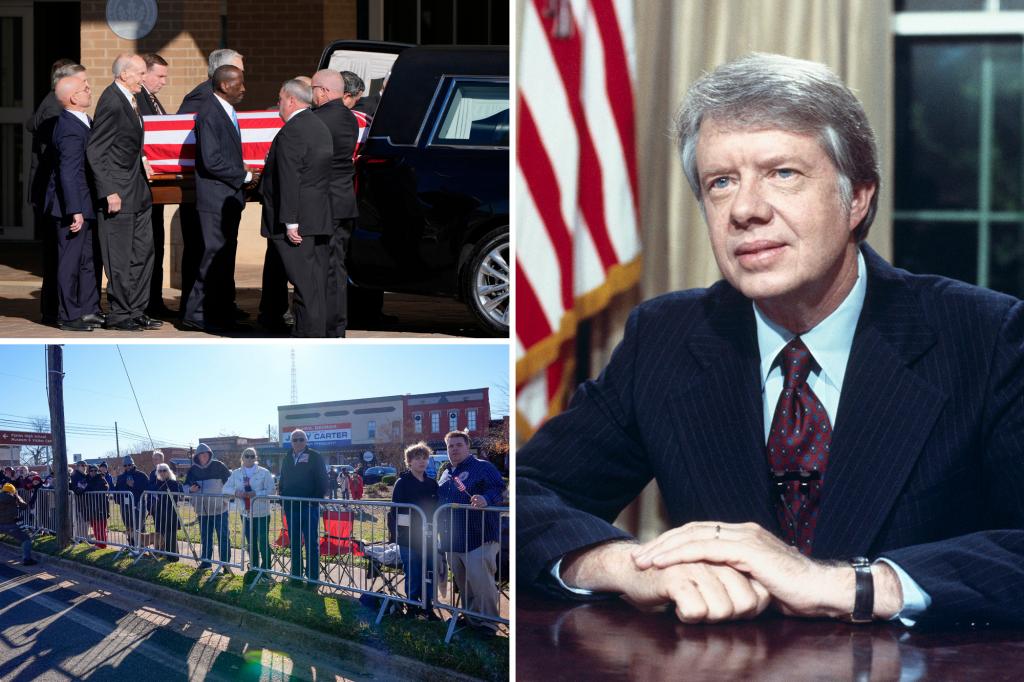The passing of former President Jimmy Carter at the age of 98 has initiated a period of national mourning and reflection on his life and legacy. His journey from the peanut farms of Plains, Georgia, to the highest office in the land, and his subsequent decades of tireless humanitarian work, has cemented his place as a unique figure in American history. The six days of funeral observances, commencing with the solemn procession from the Phoebe Sumter Medical Center in Americus, Georgia, mark the beginning of a formal farewell to a man who dedicated his life to service, both in the political arena and beyond. The image of Carter’s flag-draped casket, carried by former Secret Service agents who once guarded him, serves as a poignant reminder of his time as president and the weight of the office he held.
The motorcade bearing Carter’s remains retraced a path laden with personal and historical significance, passing by his boyhood home in Plains, a tangible symbol of his humble beginnings. This journey underscores the remarkable trajectory of his life, from a small-town upbringing to the presidency and, ultimately, to global recognition for his unwavering commitment to peace, human rights, and public health. The procession through Plains, a town deeply intertwined with the Carter family history, provides a moment for the community to grieve and celebrate the life of one of their own who rose to become a national and international icon. The return to his roots serves as a powerful bookend to a life marked by both political achievement and profound personal values.
The six days of planned observances offer a sustained opportunity for the nation and the world to honor Carter’s contributions. The ceremonies, which will include both public and private events, will allow individuals from all walks of life to pay their respects and reflect on the impact Carter had on their lives and on the world. Beyond his presidency, Carter’s enduring legacy lies in his tireless efforts to combat disease, build homes for the needy, and promote democratic values around the globe through the Carter Center. These efforts, spanning decades after he left the White House, solidified his image as a compassionate and principled leader dedicated to improving the lives of others.
The somber ceremonies surrounding Carter’s death also provide a moment for national introspection. His presidency, while facing significant challenges at home and abroad, is remembered for its emphasis on human rights, its pursuit of peace in the Middle East, and its commitment to environmental conservation. The Iran hostage crisis, the energy crisis, and a struggling economy marked a turbulent period in American history, but Carter’s steady hand and unwavering principles guided the nation through these difficulties. His post-presidency work further underscored his commitment to addressing global challenges, earning him the Nobel Peace Prize in 2002 for his decades of peacemaking efforts.
Carter’s life story embodies the American ideal of citizen leadership. His dedication to public service, both during and after his presidency, stands as a testament to the power of individual action to effect positive change in the world. His commitment to human rights, his tireless work to eradicate diseases, and his efforts to promote democracy in emerging nations serve as an inspiration to future generations to engage in meaningful service to others. The outpouring of grief and appreciation following his death reflects the profound impact he had on countless lives and his enduring legacy as a champion of peace, justice, and human dignity.
The passing of Jimmy Carter marks the end of an era, but the values he championed and the example he set will continue to inspire and guide. From the small town of Plains to the global stage, Carter’s life was a testament to the power of humility, integrity, and unwavering commitment to making the world a better place. As the nation mourns his loss, it also celebrates a life well-lived, a life devoted to service, and a legacy that will endure for generations to come. The six days of funeral observances serve not only as a farewell to a remarkable individual but also as a reminder of the ideals he embodied and the enduring power of a life dedicated to the betterment of humanity.










